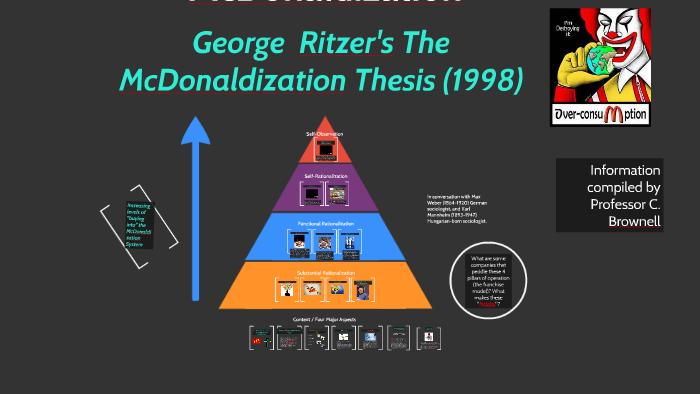Imagine walking into a fast-food restaurant, ordering a pre-determined meal, and receiving your food within minutes, all with minimal interaction. This familiar experience is not just commonplace; it’s a prime example of “Mcdonaldization,” a term coined by sociologist George Ritzer to describe the increasing presence of fast-food principles in various aspects of society.

Image: www.ernestdempsey.com
While Mcdonaldization might conjure images of Golden Arches, its reach extends far beyond the realm of hamburgers and fries. From online shopping to education, this phenomenon has become an integral part of our modern world. In this article, we’ll delve deeper into the concept of Mcdonaldization, examining its principles, exploring real-world examples, and analyzing its impact on our lives.
Understanding Mcdonaldization: Principles and Meaning
Mcdonaldization is essentially the process by which rationalization, efficiency, predictability, calculability, and control are applied to all spheres of life. It’s characterized by a focus on speed, standardization, and uniformity, often at the expense of other values like creativity, individuality, and quality.
The core principles of Mcdonaldization can be summarized as follows:
Efficiency
This principle prioritizes getting tasks done quickly and with minimal effort. In a fast-food restaurant, efficiency is exemplified by assembly lines, standardized processes, and pre-prepared ingredients. This focus on speed and efficiency often translates into simplified products and services.
Calculability
Mcdonaldization emphasizes quantifiable measures of success, such as output, speed, and profitability. This can lead to an overemphasis on numbers and a disregard for subjective qualities.

Image: prezi.com
Predictability
Mcdonaldization creates predictable experiences by standardizing products and services. The same menu, the same service, the same atmosphere – all contribute to the predictability of the experience. While predictability can be comforting, it can also stifle creativity and individuality.
Control
Control is achieved through automation, standardization, and technological advancements. By streamlining processes, Mcdonaldization seeks to minimize human error and ensure consistent outcomes.
Mcdonaldization in Action: Examples From Everyday Life
The influence of Mcdonaldization extends far beyond the fast-food industry. Let’s examine some tangible examples:
Online Shopping
E-commerce platforms like Amazon have embraced Mcdonaldization principles. The ease of ordering, the standardized product descriptions, and the automated delivery systems all contribute to a predictable and efficient shopping experience. However, this efficiency can come at the cost of personalized service and human interaction.
Education
The rise of online learning platforms and standardized testing has introduced Mcdonaldization into the field of education. Online courses offer a structured and predictable learning experience, often using standardized assessments to measure progress. This focus on efficiency and standardized measures can, however, limit the opportunity for individual learning styles and critical thinking.
Healthcare
Healthcare systems are increasingly adopting Mcdonaldization principles. Hospital protocols, pre-determined treatment plans, and automated systems aim to streamline processes and improve efficiency. But this emphasis on efficiency can sometimes lead to impersonal care and limited options for patient choice.
The Service Sector
From call centers to customer service interactions, the service sector has also embraced Mcdonaldization. Standardized scripts, automated responses, and limited interaction are all part of the effort to optimize efficiency. While this can lead to faster resolution times, it can also alienate customers who crave a more personalized experience.
Travel
The travel industry is another prime example of Mcdonaldization. Package tours, standardized hotel facilities, and automated check-in systems all contribute to a predictable and efficient travel experience. However, this predictability can limit opportunities for authentic cultural experiences.
The Impact of Mcdonaldization: Pros and Cons
Mcdonaldization, while often associated with efficiency and convenience, also has its drawbacks. It’s crucial to weigh the advantages and disadvantages of this ever-present phenomenon:
Advantages of Mcdonaldization:
- Increased Efficiency: Mcdonaldization leads to faster processing times, reduced costs, and increased productivity.
- Convenience: Standardized processes and products make it easier for consumers to navigate various systems and make quick decisions.
- Accessibility: Mcdonaldized systems can make goods and services more widely available to a larger population.
Disadvantages of Mcdonaldization:
- Loss of Individuality: The emphasis on standardization and uniformity can stifle creativity and individuality.
- Dehumanization: Mcdonaldization can lead to impersonal interactions and a focus on efficiency over human connection.
- Reduced Quality: In pursuit of efficiency and calculability, Mcdonaldization can lead to compromises in quality.
- Environmental Impact: The focus on mass production and consumption can lead to increased environmental strain.
Navigating the Mcdonaldization of our World
While Mcdonaldization is a powerful force in our modern world, it’s not insurmountable. Individuals and communities can take proactive steps to mitigate its negative impacts and embrace its benefits responsibly:
Tips for Navigating Mcdonaldization
- Seek Out Alternatives: Look for businesses and organizations that prioritize quality over speed, individuality over standardization, and human connection over automation.
- Embrace Local Businesses: Support local businesses that offer personalized services and unique experiences.
- Challenge the Status Quo: Question standardized processes and practices, advocating for more creative and human-centric solutions.
- Prioritize Meaningful Interactions: Make an effort to connect with others on a personal level and challenge the impersonal nature of Mcdonaldized systems.
- Empower Yourself As a Consumer: Be a conscious consumer who values quality, sustainability, and ethical practices.
By actively seeking out alternatives, supporting local businesses, and prioritizing human connection, individuals can help shape a more balanced and meaningful world, one that embraces both efficiency and human values.
FAQ: Mcdonaldization
Q: What are some other common examples of Mcdonaldization?
A: Other common examples of Mcdonaldization include self-checkout kiosks at supermarkets, standardized legal documents with pre-filled sections, and online dating platforms that match users based on predetermined criteria.
Q: Is Mcdonaldization a good or bad thing?
A: Mcdonaldization has both positive and negative aspects. While it promotes efficiency and convenience, it can also lead to dehumanization, a loss of individuality, and reduced quality.
Q: Can we stop Mcdonaldization from spreading?
A: While we can’t entirely prevent its spread, we can actively challenge its negative effects by seeking out alternatives, supporting local businesses, and prioritizing human connection.
Q: What does Mcdonaldization have to do with technology?
A: Technology often plays a crucial role in enabling Mcdonaldization. Automation, standardization, and digitalization all contribute to the efficiency and control that characterize this phenomenon.
Mcdonaldization Efficiency Examples
Conclusion
Mcdonaldization is a complex and pervasive phenomenon shaping our lives. While it offers undeniable benefits in terms of efficiency and convenience, it’s crucial to recognize its potential drawbacks. By understanding the principles of Mcdonaldization, its impact on our daily lives, and the steps we can take to navigate this trend, we can strive for a more balanced and meaningful world that values both efficiency and human connection.
Are you interested in learning more about the impact of Mcdonaldization on specific industries or exploring alternative approaches to achieving efficiency without compromising human values? Share your thoughts and questions in the comments below!



/GettyImages-173599369-58ad68f83df78c345b829dfc.jpg?w=740&resize=740,414&ssl=1)


